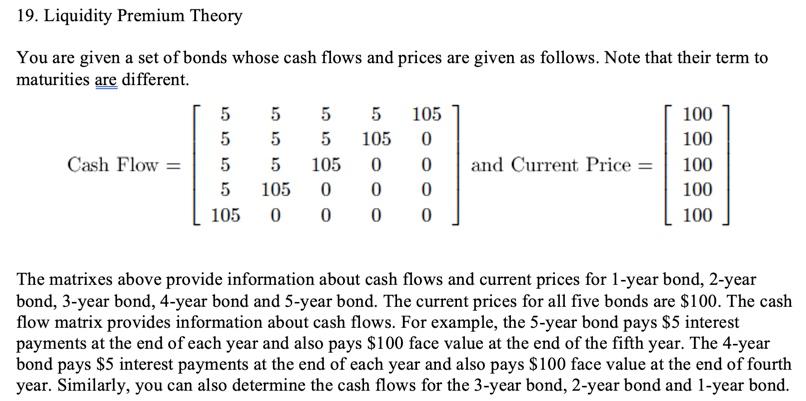Answered step by step
Verified Expert Solution
Question
1 Approved Answer
Answer Question 3 & 4 (3) Assume that the liquidity premiums for the five bonds are given in the following table. Calculate the one-year interest
 Answer Question 3 & 4
Answer Question 3 & 4
(3) Assume that the liquidity premiums for the five bonds are given in the following table. Calculate the one-year interest rates in year 1, 2, 3, 4 and 5 based on the liquidity premium theory.
| Bonds | Liquidity Premium |
| 1-year bond | 0% |
| 2-year bond | 0.5% |
| 3-year bond | 1% |
| 4-year bond | 1.5% |
| 5-year bond | 2% |
(4) Given your answers to (3) and (4), how do the expected future short-term interest rates change?
19. Liquidity Premium Theory You are given a set of bonds whose cash flows and prices are given as follows. Note that their term to maturities are different. 5 5 5 5 105 100 5 5 5 105 0 100 Cash Flow = 5 5 105 0 0 and Current Price 100 5 105 0 0 0 100 105 0 0 0 0 100 The matrixes above provide information about cash flows and current prices for 1-year bond, 2-year bond, 3-year bond, 4-year bond and 5-year bond. The current prices for all five bonds are $100. The cash flow matrix provides information about cash flows. For example, the 5-year bond pays $5 interest payments at the end of each year and also pays $100 face value at the end of the fifth year. The 4-year bond pays $5 interest payments at the end of each year and also pays $100 face value at the end of fourth year. Similarly, you can also determine the cash flows for the 3-year bond, 2-year bond and 1-year bond. 19. Liquidity Premium Theory You are given a set of bonds whose cash flows and prices are given as follows. Note that their term to maturities are different. 5 5 5 5 105 100 5 5 5 105 0 100 Cash Flow = 5 5 105 0 0 and Current Price 100 5 105 0 0 0 100 105 0 0 0 0 100 The matrixes above provide information about cash flows and current prices for 1-year bond, 2-year bond, 3-year bond, 4-year bond and 5-year bond. The current prices for all five bonds are $100. The cash flow matrix provides information about cash flows. For example, the 5-year bond pays $5 interest payments at the end of each year and also pays $100 face value at the end of the fifth year. The 4-year bond pays $5 interest payments at the end of each year and also pays $100 face value at the end of fourth year. Similarly, you can also determine the cash flows for the 3-year bond, 2-year bond and 1-year bondStep by Step Solution
There are 3 Steps involved in it
Step: 1

Get Instant Access to Expert-Tailored Solutions
See step-by-step solutions with expert insights and AI powered tools for academic success
Step: 2

Step: 3

Ace Your Homework with AI
Get the answers you need in no time with our AI-driven, step-by-step assistance
Get Started


